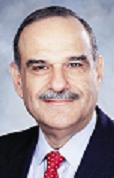Frank Donze of T-P
reports that the Regional Transit Authority has offered a $650,000 cash settlement to Glenn Haydel, the politically connected, former management consultant whose contract was terminated in 2003 amid allegations that he had bilked the agency out of hundreds of thousands of dollars.
You may remember that we focused on the “politically connected” label as meaning hold on to your wallet and that is certainly the case here. Victor Franckiewicz, the RTA's lead attorney on the case, said Thursday that both sides are "closing in on a deal."
Scott Yount, Haydel's attorney, agreed that a settlement is imminent. "We've reached agreement on most of the major issues," he said. "We have a little fine tuning to do and hope to have everything resolved in the next few days."
But the RTA board made it clear in the resolution offering the payment that it still believes there were serious problems with Haydel's performance. An investigation of "management practices, decisions, procurements and billing practices" on Haydel's watch "that the RTA board did not approve" were "abusive and repugnant to the public interest," the resolution said.
The cash offer, which Haydel has not yet accepted, is designed to bring an end to a bitter, expensive legal battle that already has cost the RTA more than $400,000 in attorneys' fees. An ongoing federal probe of Haydel's business dealings with the RTA, however, would be unaffected by the settlement.
So the tab is over a million dollars for this legal battle, not counting the cost of the abuse of the public weal when Haydel was writing his own ticket. Just hours after Haydel rejected the RTA's initial settlement offer on the trial's first day, the transit agency upped the stakes in the legal battle, slapping Haydel with a lawsuit alleging that he bilked the agency out of hundreds of thousands of dollars during a 10-year period.
Under the deal, Haydel also would liquidate his firm, Metro New Orleans Transit Inc., and agree to never again do business with the RTA.
RTA Chairman James Reiss Jr., who has been slapped with a defamation suit by Haydel, said the decision to pay his accuser was a difficult one.
"But I know this is the right thing to do," said Reiss, an appointee of Mayor Ray Nagin. "Would I have preferred a different outcome? Obviously, yes. But in the best interests of this agency and the people we serve, we've got to put this behind us."
Reiss said RTA lawyers have told board members that no matter how the district court ruled, the litigation was destined to run its full course to the state Supreme Court and drag on for another two to three years. Under that scenario, Reiss said, the RTA was facing the likelihood of an additional $1.5 million to $2 million in legal fees. "And we couldn't allow that to happen," he said.
Reiss said the sting of paying Haydel $650,000 will be mitigated somewhat by two factors: The more than $2 million the RTA has saved in management fees since he tore up Metro's five-year $3.7 million contract in December 2002 and found RTA employees to handle much of the work the firm was paying subcontractors; and the $700,000 the agency has saved since he fired six top administrators hired on Haydel's watch at salaries of more than $100,000 each.




